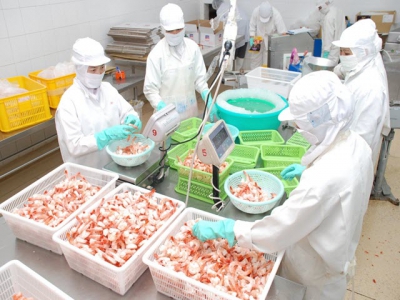Vietnams exporters face tougher Chinese food inspection regime

Vietnam’s agro-forestry-fishery exports to China face many difficulties due to stronger Chinese inspection and supervision of food safety.
Businesses need to meet the requirements of import partners
According to the Consulate General of Vietnam in Nanning (Guangxi Province, China), Guangxi is strictly managing goods consumed at markets and supermarkets as well as strengthening inspection of certificates on quality standards, origin and procedures relating to purchasing agricultural products. Guangxi bans trading and storage of foods that do not meet food safety standards and requires quarantine certificates from China customs for imported food products.
Dongxing City, China, across the border from Mong Cai City, Quang Ninh Province, is also carrying out inspections of origin and quality of seafood and meat products at agricultural markets, supermarkets and hotels.
Vy Cong Tuong, deputy director of the Lang Son Department of Vietnam Customs, said the Chinese market has increased its requirements on standards, quality and traceability. In particular, all Vietnamese vehicles entering China must buy vehicle insurance from July 1, 2020.
At the request of the Chinese market, the Ministry of Industry and Trade is recommending that businesses and households producing agricultural products and seafood exported to China enhance management of quality for their exports. They should also coordinate with import partners in China to ensure that their export products meet Chinese regulations on quality standards, quarantine, food safety and traceability. Businesses need to keep up-to-date with market information to regulate volume of export goods transported to border gates in order to lower risks and save time in customs clearance for goods at border gates.
Dang Phuc Nguyen, secretary-general of the Vietnam Fruit and Vegetables Association, said cultivation methods must be changed and packaging design improved in order to meet the needs of Chinese partners.
Nguyen Dinh Tung, board chair of the Vina T&T Group, said Vietnamese businesses are promoting the development of material areas to produce clean farming products, aiming to improve export value and increase their domestic market shares.
Vietnam needs to promote linkages between processing plants, businesses and producers in material areas in order to ensure product quality and increase product competitiveness.
Related news
 Global potato researches gather to find solutions for blackleg disease
Global potato researches gather to find solutions for blackleg disease They are trying to find a way to stop the blackleg potato disease which threatens the potato industry.
 Gene may aid high-yield, high-protein soybeans
Gene may aid high-yield, high-protein soybeans Leftovers can be valuable, like when soybean seed is crushed and the oil is extracted, what’s left is soybean meal, a source of high-quality protein.
 Startup fights food waste with travel companions for fruits and veggies
Startup fights food waste with travel companions for fruits and veggies This is the latest in a regular series exploring early-stage technologies and scientific developments that could play a role in corporate solutions to climate
 Dipstick technology could revolutionize disease diagnosis
Dipstick technology could revolutionize disease diagnosis Dipstick can purify DNA and RNA from plant, animal and microbe samples in under 30 seconds. Dipstick technology could revolutionize disease diagnosis
 Best practices being developed for organic beekeeping industry
Best practices being developed for organic beekeeping industry Overarching goals of project are to generate evidence-based knowledge for best management practices that will improve colony health in a sustainable